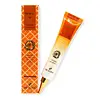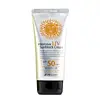What's inside
What's inside
 Key Ingredients
Key Ingredients

 Benefits
Benefits

 Concerns
Concerns

 Ingredients Side-by-side
Ingredients Side-by-side

Water
Skin ConditioningParaffinum Liquidum
EmollientGlycerin
HumectantHorse Fat
Skin ConditioningCaprylic/Capric Triglyceride
MaskingPolysorbate 60
EmulsifyingCetearyl Alcohol
EmollientStearic Acid
CleansingBeeswax
Emulsion StabilisingMicrocrystalline Wax
Emulsion StabilisingGlyceryl Stearate
EmollientGlyceryl Stearate Se
EmulsifyingPolyacrylamide
Laureth-7
EmulsifyingSorbitan Dioleate
EmulsifyingCyclopentasiloxane
EmollientCyclohexasiloxane
EmollientGalactomyces Ferment Filtrate
HumectantCordyceps Sinensis Extract
AntioxidantSyringa Vulgaris Extract
Skin ConditioningCollybia Mushroom Extract
Punica Granatum Extract
AstringentPanthenol
Skin ConditioningPhenoxyethanol
PreservativeCaprylyl Glycol
EmollientCarbomer
Emulsion StabilisingTriethanolamine
BufferingAdenosine
Skin ConditioningSodium Hyaluronate
HumectantCellulose Gum
Emulsion StabilisingCitrus Aurantium Dulcis Peel Oil
MaskingLavandula Angustifolia Oil
MaskingCitrus Grandis Peel Oil
MaskingPelargonium Graveolens Oil
MaskingCitrus Aurantium Bergamia Fruit Oil
MaskingCitrus Limon Peel Oil
MaskingSodium Edtmp
Hc Yellow No. 4
Water, Paraffinum Liquidum, Glycerin, Horse Fat, Caprylic/Capric Triglyceride, Polysorbate 60, Cetearyl Alcohol, Stearic Acid, Beeswax, Microcrystalline Wax, Glyceryl Stearate, Glyceryl Stearate Se, Polyacrylamide, Laureth-7, Sorbitan Dioleate, Cyclopentasiloxane, Cyclohexasiloxane, Galactomyces Ferment Filtrate, Cordyceps Sinensis Extract, Syringa Vulgaris Extract, Collybia Mushroom Extract, Punica Granatum Extract, Panthenol, Phenoxyethanol, Caprylyl Glycol, Carbomer, Triethanolamine, Adenosine, Sodium Hyaluronate, Cellulose Gum, Citrus Aurantium Dulcis Peel Oil, Lavandula Angustifolia Oil, Citrus Grandis Peel Oil, Pelargonium Graveolens Oil, Citrus Aurantium Bergamia Fruit Oil, Citrus Limon Peel Oil, Sodium Edtmp, Hc Yellow No. 4
Water
Skin ConditioningEthylhexyl Methoxycinnamate
UV AbsorberGlycerin
HumectantEthylhexyl Salicylate
UV AbsorberParaffinum Liquidum
EmollientTitanium Dioxide
Cosmetic ColorantIsoamyl P-Methoxycinnamate
UV AbsorberDiethylamino Hydroxybenzoyl Hexyl Benzoate
UV FilterCetyl Alcohol
EmollientZinc Oxide
Cosmetic ColorantStearic Acid
CleansingGlyceryl Stearate
EmollientPolysorbate 60
EmulsifyingBeeswax
Emulsion StabilisingEthylhexyl Triazone
UV AbsorberPEG-100 Stearate
Butylene Glycol
HumectantAloe Barbadensis Leaf Extract
EmollientMorus Alba Bark Extract
Skin ConditioningPanax Ginseng Root Extract
EmollientPhenoxyethanol
PreservativeBetaine
HumectantDimethicone
EmollientCarbomer
Emulsion StabilisingTriethanolamine
BufferingDisodium EDTA
CI 19140
Cosmetic ColorantCI 15985
Cosmetic ColorantParfum
MaskingWater, Ethylhexyl Methoxycinnamate, Glycerin, Ethylhexyl Salicylate, Paraffinum Liquidum, Titanium Dioxide, Isoamyl P-Methoxycinnamate, Diethylamino Hydroxybenzoyl Hexyl Benzoate, Cetyl Alcohol, Zinc Oxide, Stearic Acid, Glyceryl Stearate, Polysorbate 60, Beeswax, Ethylhexyl Triazone, PEG-100 Stearate, Butylene Glycol, Aloe Barbadensis Leaf Extract, Morus Alba Bark Extract, Panax Ginseng Root Extract, Phenoxyethanol, Betaine, Dimethicone, Carbomer, Triethanolamine, Disodium EDTA, CI 19140, CI 15985, Parfum
 Reviews
Reviews

Ingredients Explained
These ingredients are found in both products.
Ingredients higher up in an ingredient list are typically present in a larger amount.
Beeswax is natural wax produced by honey bees and can be synthetically created. It consists mainly of fatty acid esters and long-chain alcohols.
In cosmetics, beeswax is a emollient. Due to its waxy structure, it creates a protective barrier. This barrier prevents water from evaporating off the skin.
This may not be a good ingredient for oily skin. We recommend speaking with a professional if you have concerns.
Beeswax cannot be removed with water, but can be taken off with an oil cleanser.
Beeswax is also antiseptic and contains vitamin A.
Learn more about BeeswaxCarbomer is a polymer of acrylic acid. Its main role is to create a gel consistency.
A high amount of carbomer can cause pilling or balling up of products. Don't worry, most products contain 1% or less of carbomer.
Glycerin is already naturally found in your skin. It helps moisturize and protect your skin.
A study from 2016 found glycerin to be more effective as a humectant than AHAs and hyaluronic acid.
As a humectant, it helps the skin stay hydrated by pulling moisture to your skin. The low molecular weight of glycerin allows it to pull moisture into the deeper layers of your skin.
Hydrated skin improves your skin barrier; Your skin barrier helps protect against irritants and bacteria.
Glycerin has also been found to have antimicrobial and antiviral properties. Due to these properties, glycerin is often used in wound and burn treatments.
In cosmetics, glycerin is usually derived from plants such as soybean or palm. However, it can also be sourced from animals, such as tallow or animal fat.
This ingredient is organic, colorless, odorless, and non-toxic.
Glycerin is the name for this ingredient in American English. British English uses Glycerol/Glycerine.
Learn more about GlycerinGlyceryl Stearate is a mix of glycerin and stearic acid.
It is used to stabilize the mixing of water and oil ingredients. By preventing these ingredients from separating, it can help elongate shelf life. It can also help thicken the product's texture.
As an emollient, it helps soften skin and supports barrier-replenishing ingredients.
In cosmetics, Glyceryl Stearate is often made from vegetable oils or synthetically produced.
This ingredient may not be fungal-acne safe
Fun fact: The human body also creates Glyceryl Stearate naturally.
Learn more about Glyceryl StearateParaffinum Liquidum is also known as liquid paraffin. It is a type of highly refined mineral oil.
Like other oils, Paraffinum Liquidum has emollient properties. Emollients help soothe and soften the skin. By creating a barrier to trap moisture within, emollients help keep your skin hydrated.
Paraffinum Liquidum does not irritate the skin and is non-comedogenic.
Learn more about Paraffinum LiquidumPhenoxyethanol is a preservative that has germicide, antimicrobial, and aromatic properties. Studies show that phenoxyethanol can prevent microbial growth. By itself, it has a scent that is similar to that of a rose.
It's often used in formulations along with Caprylyl Glycol to preserve the shelf life of products.
Polysorbate 60 is used to help stabilize products. It is a surfactant and emulsifier. These properties help keep ingredients together in a product. Surfactants help reduce surface tension between ingredients with different states, such as liquids and solids. Emulsifiers help prevent oils and waters from separating.
Polysorbate 60 is sorbitol-based and created from the ethoxylation of sorbitan. Ethoxylation is a chemical reaction used to add ethylene oxide. Sorbitan is a the dehydrated version of sorbitol, a sugar found in fruits.
In this case, the 60 comes from reacting 60 units of ethylene oxide with sorbitan.
Polysorbates are commonly used in medicine and foods.
Learn more about Polysorbate 60Stearic Acid is a fatty acid. It is an emollient, emulsifier, and texture enhancer.
As an emollient, stearic acid helps soften skin. It aids the skin's protective barrier by preventing water loss. It also provides a gentle cleansing effect without stripping away natural oils.
Stearic acid may also be used to enhance the texture of products. It can add volume and stabilize ingredients such as water and oil. This can help water and oil ingredients from separating.
Sources of stearic acid include animal or vegetable fats/oils such as coconut or shea. It can be naturally found in butter, cocoa butter, shea butter, vegetable fats, and animal tallow.
This ingredient may not be Malassezia folliculitis, or fungal-acne safe.
Learn more about Stearic AcidTriethanolamine is an emulsifier and pH adjuster. It is created using ethylene oxide and ammonia. This gives Triethanolamine a nitrogen core and a similar scent to ammonia.
As an emulsifier, it prevents ingredients from separating and enhances texture by adding volume to a product.
PH adjusters are common in cosmetic products. The pH of a product can affect the effectiveness of other ingredients. A product with a high pH may also irritate the skin.
Learn more about TriethanolamineWater. It's the most common cosmetic ingredient of all. You'll usually see it at the top of ingredient lists, meaning that it makes up the largest part of the product.
So why is it so popular? Water most often acts as a solvent - this means that it helps dissolve other ingredients into the formulation.
You'll also recognize water as that liquid we all need to stay alive. If you see this, drink a glass of water. Stay hydrated!
Learn more about Water